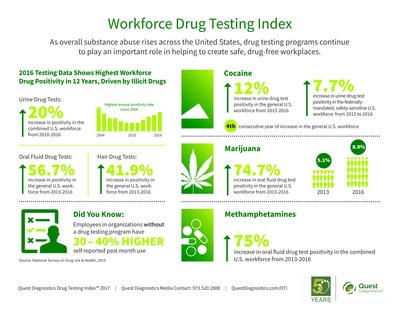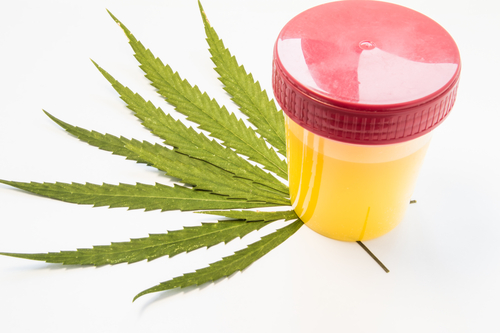Positive results from workforce drug tests are at the highest rate in twelve years, according to the recently released Quest Diagnostics Drug Testing Index. Of particular significance to Colorado employers is the increase in positive marijuana results in urine drug tests in 2016 – the first year of results after Colorado legalized recreational marijuana use.
Marijuana Testing Methods Show Varied Positivity Rates
In creating its annual report, Quest Diagnostics analyzes more than ten million drug test results from tests it conducted on behalf of U.S. employers. Positive results for marijuana for the general U.S. workforce increased significantly over the past few years, with the percentages of positive marijuana results varying by the method of testing, as follows:
- Oral fluid testing: up nearly 75% from 2013 (5.1%) to 2016 (8.9%)
- Hair testing: up over 4% from 2015 (7.0%) to 2016 (7.3%)
- Urine testing: up 4% from 2015 (2.4%) to 2016 (2.5%)
In Colorado, the increase in positive marijuana urine tests was a striking 11% from 2015 (2.61%) to 2016 (2.9%). The positive marijuana urine test results also increased significantly by nine percent from 2015 to 2016 in Washington state, where recreational marijuana also was legalized. Whether these state increases can be explained by the legalization of recreational pot is unclear, but both states reflected increased marijuana positivity higher than the national increase for the same years.
Nationwide Increase In Cocaine and Methamphetamine Positivity
The recent Quest report revealed that the positivity rate for urine testing for cocaine increased twelve percent in 2016 for the general U.S. workforce. While that annual percentage increase is high, the percent of U.S. workers who tested positive for cocaine in a urine test by Quest in 2016 was a relatively low 0.28 percent.
The results for amphetamines, which includes amphetamine and methamphetamine, increased more than eight percent in urine testing from 2015 to 2016 in the general U.S. workforce. Looking at the increase over the last four years, methamphetamine positivity in urine testing rose 64 percent. In oral fluid testing, those numbers are even higher as methamphetamines positivity increased 75 percent between 2013 (0.24%) and 2016 (0.42%).
Here is a look at an infographic from Quest Diagnostic regarding the results from its most recent report:

Workforce Drug Testing Index: As overall substance abuse rises across the United States, drug testing programs continue to play an important role in helping to create safe, drug-free workplaces. (PRNewsfoto/Quest Diagnostics)
Drug Testing Considerations
With positive drug test results on the rise, more employers will likely face the tricky employment decisions associated with positive tests. Here are some legal issues and best practices to consider:
- Have a written, zero tolerance drug policy prohibiting employees, while on company premises or while engaged on company business, from (a) the use, possession, sale, and distribution of illegal drugs, and (b) being under the influence of illegal drugs. Illegal drugs should be defined as any substance that is illegal under either federal or state law as well as prescription drugs prescribed to another person or that are taken in a dosage or manner that was not prescribed.
- Consider whether you will require employees to report their use of prescription drugs that may affect their ability to safely perform their work duties, especially for those in safety-sensitive positions. Be careful, however, not to discriminate against employees who use prescription medications to treat a disability. You may need to make a reasonable accommodation when dealing with a disabled individual.
- If you conduct drug tests, have a written policy outlining the following:
- when tests are conducted (e.g., pre-employment, reasonable suspicion, random, post-accident, etc.)
- consequences for failing a drug test, up to and including termination
- notification that refusing a drug test will result in termination
- any state-specific testing requirements
- If an employee uses marijuana for medical purposes, consider whether any employment accommodation obligations exist under applicable law. Colorado’s medical marijuana law does not specify an accommodation requirement and thus far, Colorado courts have not imposed such a requirement. Some other state’s medical marijuana laws, however, do impose workplace accommodation obligations, so when faced with a positive marijuana drug test, be sure to consider any applicable laws.
- Keep drug test results and any other medical information confidential. This means you should keep separate medical or drug testing files so that this information does not get put in an employee’s regular personnel file. Also limit the individuals who have access to this information.
By planning ahead with appropriate policies and knowledge of your legal requirements, you will help your organization handle positive drug test results properly. When in doubt, consult with a competent employment lawyer.


 By
By